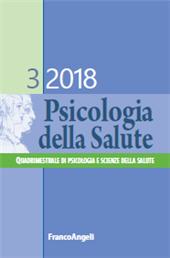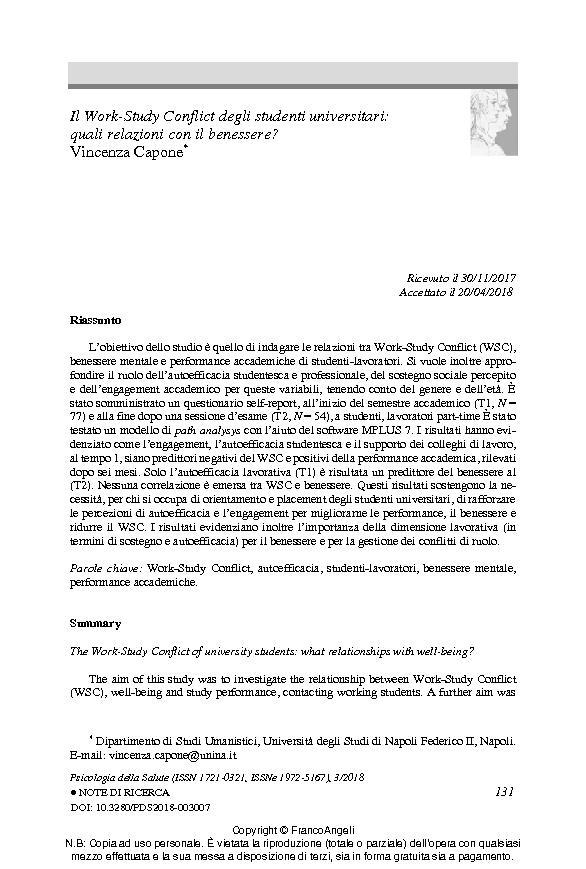2018 - Franco Angeli
Articolo
Versione Digitale
Download | Copia/incolla | Stampa
Il Work-Study Conflict degli studenti universitari : quali relazioni con il benessere?
131-144 p.
- L'obiettivo dello studio è quello di indagare le relazioni tra Work-Study Conflict (WSC), benessere mentale e performance accademiche di studenti-lavoratori. Si vuole inoltre approfondire il ruolo dell'autoefficacia studentesca e professionale, del sostegno sociale percepito e dell'engagement accademico per queste variabili, tenendo conto del genere e dell'età. È stato somministrato un questionario self-report, all'inizio del semestre accademico (T1, N = 77) e alla fine dopo una sessione d'esame (T2, N = 54), a studenti, lavoratori part-time È stato testato un modello di path analysys con l'aiuto del software MPLUS 7. I risultati hanno evidenziato come l'engagement, l'autoefficacia studentesca e il supporto dei colleghi di lavoro, al tempo 1, siano predittori negativi del WSC e positivi della performance accademica, rilevati dopo sei mesi. Solo l'autoefficacia lavorativa (T1) è risultata un predittore del benessere al (T2). Nessuna correlazione è emersa tra WSC e benessere.
- Questi risultati sostengono la necessità, per chi si occupa di orientamento e placement degli studenti universitari, di rafforzare le percezioni di autoefficacia e l'engagement per migliorarne le performance, il benessere e ridurre il WSC. I risultati evidenziano inoltre l'importanza della dimensione lavorativa (in termini di sostegno e autoefficacia) per il benessere e per la gestione dei conflitti di ruolo. [Testo dell'editore].
- The aim of this study was to investigate the relationship between Work-Study Conflict (WSC), well-being and study performance, contacting working students. A further aim was to analyze the role of work and study self-efficacy, perceived social support, and study en-gagement for these variables, considering age and gender. A self-report questionnaire was submitted at the beginning of the academic semester (T1, N = 77) and at the end, after an exam session, (T2, N = 54) to part-time working students. A model of path analysis with MPLUS software 7 was tested. The results highlighted how engagement (T1), student self-efficacy (T1) and support of work colleagues (T1) negatively predicted WSC (T2) and positively academic performance (T2). Only self-efficacy (T1) was a predictor of well-being at (T2).
- No correlation emerged between WSC and well-being. For those who are interested in orientation and placement of university students, these findings support the need to reinforce self-efficacy and engagement to improve performance, well-being and reduce WSC. The results also highlight the importance of the work dimensions (in terms of support and work self-efficacy) for well-being and for managing role conflicts. [Publisher's text].
-
Informazioni
Codice DOI: 10.3280/PDS2018-003007
ISSN: 1972-5167
PAROLE CHIAVE
- Work-Study Conflict, autoefficacia, studenti-lavoratori, benessere mentale, performance accademiche
- Work-Study Conflict, self-efficacy, working students, mental well-being, study performance
-
Nello stesso fascicolo
- Gli Interventi Assistiti dagli Animali come processi di promozione della salute : una review sistematica
- La depressione nell'epilessia : cause, diagnosi e trattamento
- Sospesi nel tempo : inattività e malessere percepito in giovani adulti NEET
- Percezione della malattia e aderenza al progetto terapeutico riabilitativo : il punto di vista degli adolescenti asmatici
- Percezione delle qualità affettive ambientali e livello di stress in Radiologia Senologica : effetto di un intervento di umanizzazione pittorica
- When obtaining support is important : the relationship between optimism, disclosure, and perceived peer support in a sample of young women
- Il Work-Study Conflict degli studenti universitari : quali relazioni con il benessere?
- Intervento psicoeducativo con pazienti parkinsoniani e loro caregiver : descrizione di un'esperienza



